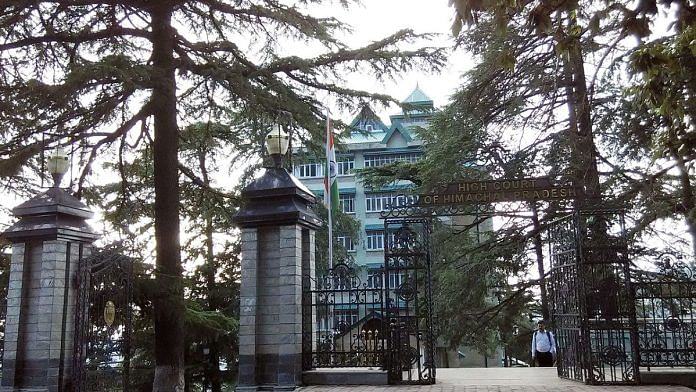Shimla: Himachal Pradesh High Court Thursday stayed the state government’s decision to grant Scheduled Tribe (ST) status to members of the ‘Hattee’ community of Trans-Giri area of Sirmaur district.
In an interim order, the two-judge bench comprising Chief Justice M.S. Ramchandra Rao and Justice Jyotsna Rewal Dua, noted that “prima facie there appears to be manifest arbitrariness and glaring unconstitutionality” in the law passed to grant ST status to ‘Hattees’.
The law was challenged by, among others, the Gurjar Samaj Kalyan Parishad and Anusuchit Jati Adhikar Sanrakshan Samiti.
Asked how they plan to further the demand for ST status for ‘Hattees’, Hattee Vikas Manch spokesperson Rames Singta told ThePrint, “We will study the court order and respond to it in the court of law.”
The Constitution (Scheduled Tribes) Order (Third Amendment) Bill, 2022, which sought to include ‘Hattees’ in the state list of STs, was passed by the Lok Sabha in December 2022 and Rajya Sabha in July the next year. A proposal in this regard was cleared by the Union Cabinet in October 2022.
In October last year, the Himachal Pradesh government’s Tribal Development Department sought clarification from the Ministry of Tribal Affairs on who the ‘Hattees’ actually are and whether members of the Scheduled Caste (SC) community fall into this category.
The ministry issued a clarification in November following which the state government issued a notification on 1 January 2024, granting ST status to ‘Hattees’ living in the Trans-Giri area, barring those who were already eligible for reservation under the SC quota.
Taking objection to this exclusion of SCs, the high court in its interim order noted: “We are baffled as to how the Ministry of Tribal Affairs, Union of India, could have given such advice without Parliament making the said exclusion under clause (2) of Article 341 of the Constitution of India in the list of SCs mentioned in the Constitution (Scheduled Castes) Order, 1950.”
“Irreparable injury is likely to be caused if the interim relief is not granted,” the bench noted, staying the “implementation of the Constitution (Scheduled Tribes) Orders (Third Amendment) Act, 2023 as well as the state notification” till 18 March 2024.
In its interim order, the high court also pointed out that the central government had in 1995, 2006 and 2017 rejected requests to grant ST status to ‘Hattees’.
Turning down the request in 2017, the government said ‘Hattee’ is a blanket or generic term which applies to all inhabitants of the Trans-Giri area.
“The term Hattee does not refer to a distinct tribe or a single community. Using a blanket term to cover all inhabitants, whether they deserve Scheduled Tribe status or not, is at present against the principle of notification or declaring community/communities as Scheduled Caste/Tribes,” the central government had said at the time.
Citing this response, the high court in its interim order observed: “These were very strong reasons and justification ought to be provided by the Union of India and the State Government for now taking a diametrically opposite view in August 2023 and enacting the impugned law.”
The court will hear the matter next on 18 March.
‘Hattee’ reservation & opposition to it
The term ‘Hattee’ is derived from ‘Haat’ which means market, Amar Chand, a retired school teacher from the Trans-Giri area told ThePrint. “This area is quite backward and the Hattee community is still connected to its roots and culture,” he added.
The demand for reservation for ‘Hattees’ was first raised in 1967 after ‘Jaunsaris’ — inhabitants of neighbouring Jaunsar Bawar, now in Uttarakhand — were included in the ST list of undivided Uttar Pradesh.
“We have relations in the Jaunsar Bawar area. They are ST and we are not. Before the reservation, that area was worse than ours in terms of development but the situation is the opposite now,” said M.L. Sharma, a resident of Shillai in Sirmaur district.
Asked how the implementation of the law impacts the share of reservation among members of the ST community, local leader Anil Gurjar told ThePrint that there are nearly 4 lakh tribals in Himachal Pradesh’s Kinnaur, Lahaul and Spiti and Chamba districts.
“And now, 1.60 lakh Hattees have been added to the kitty of STs which had 7.5 percent reservations in government jobs,” he said.
Gurjar added, “There are several influential people amongst Hattees and giving them reservation will go against the spirit of reservation.”
In its petition in the high court, Anusuchit Jati Adhikar Sanrakshan Samiti had submitted: “There is no tribal ‘Hattee’ tribe in the state, and the rights of reservation were granted to Rajput and high-caste Brahmins in the name of ‘Hattee,’ which is not found as a homogeneous recorded community.”
(Edited by Amrtansh Arora)
Also Read: Himachal bid for land to tribals near China-occupied Tibet stuck with governor, Congress protests



